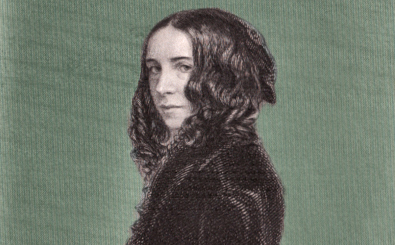
Elizabeth Barrett spent the early part of her life confined to a room on the second floor of her father’s house in London.When she eloped with Robert Browning to Italy in 1846, her family despaired, certain that she would come to death. A year after their secret wedding, a newly disinherited Elizabeth was traipsing around Italy, enjoying her newly found good health, and composing what would be her most famous work, “Sonnets from the Portuguese.” Both poets wrote often to their families boasting of Elizabeth’s revived well-being.
Elizabeth Barrett Browning and Robert Browning to Anna Brownell Jameson
Florence
December [1847]
…Now too, you are aware of our being in piazza Pitti, in a charmed circle of sunblaze. Our rooms are small but of course as cheerful as being under the very eyelids of the sun must make everything; and we have a cook in the house who takes the office of traiteur on him, & gives us English mutton chops at Florentine prices,—both of us quite well & in spirits, and (though you never will believe this) happier than ever. For my own part, you know I need not say a word if it were not true and I muse say to you who saw the beginning with us, that this end of fifteen months is just fifteen times better and brighter; the mystical “moon” growing larger and larger till scarcely room is left for any stars at all: the only differences which have touched me, being to more and more happiness. It would have been worse than unreasonable if in marrying I had expected one quarter of such happiness, and indeed I did not, to do myself justice—and every now and then I look round in astonishment and thankfulness together, yet with a sort of horror, seeing that this not Heaven after all. We live just as we did when you knew us, just as shut-up a life—Robert never goes anywhere except to take a walk with Flush… which is’nt [sic] my fault as you may imagine: he has not been out evening of the fifteen months: but what with music and books and writing and talking, we scarcely know how the days go—it’s such a gallop on the grass. We are going through some of old Sacchettis novelets now: characteristic work for Florence, if somewhat dull elsewhere. Boccaccios cant [sic] be expected to spring up with the vines in rows, even in this climate. We got a newly printed addition to Savonarola’s poems the other day—very flat and cold—they did not catch fire when he was burnt. The most poetic thing in the book, is his face on the fist page, with that eager devouring soul in the eyes of it. […] I am looking so well that a cousin of mine lately married and on the usual tour, who came to visit us on her way through Florence, declared it was a case “past recognition”—We had parted in my room in poor Wimpole Street,— so of course she did see some difference. A summer in the open air, and half a winter with liberty of walking out a little most days, and unclouded happiness (except the transalpine clouds!) through out all that time, may be supposed to have had an influence for good. In making people egotists… you will say. Well—give me back my egotism, I only beseech you. Let it be an I for an I, according to the strictest of the Jewish Law […]
Most affectionate,
EBB
[Continued by RB in the corner of the page]
Dear Aunt Nina . . A corner is just the place for eating Christmas pies in, but for venting Christmas wishes, hardly! What has Ba told, and wished you in the way of love? Because I wish you the same—and Geddie being part of you, gets her due part. We are as happy as two owls in a hole, two toads under a tree-stump,—or any other queer two poking creatures that are let live after the fashion of their black hearts—only Ba is fat and rosy,—yes, indeed!
Florence is empty and pleasant – Goodbye therefore till next year—shall it not be then we meet?
God bless you—
RB.
From The Browning’s Correspondence: Volume 14: 1846-1847. Edited by Philip Kelley and Scott Lewis. Wedgestone Press: Winifield, 1998.
FURTHER READING
Read about their years in Florence here.
The New Inquiry has a wonderful article about Elizabeth Barrett’s spiritualism.


